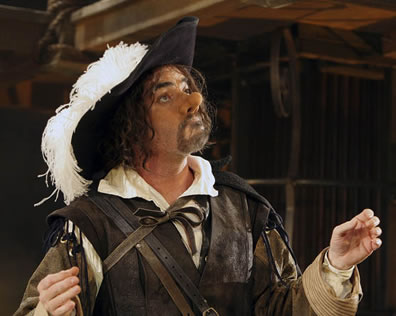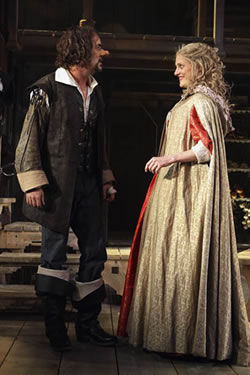Cyrano
The Comedy and Tragedy
when Language Fails Us
By Edmond Rostand. Translated by Michael Hollinger. Adapted by Michael Hollinger and Aaron Posner.
Folger Theatre, Washington, D.C.
Thursday, May 19, 2011, Seats F–8&10 (right stalls)
Directed by Aaron Posner

Eric Hissom as Cyrano and, below, with Brenda Withers as Roxane in the production of Cyrano at the Folger Theatre. Although the play focuses on the tragedy of Cyrano, who could not reveal his feelings for the woman he loved over the years, it also is Roxane's tragedy, who loved the wrong man all those years. Photo by Carol Pratt, Folger Shakespeare Library.
Form reflected theme in Rostand's classic 1897 play Cyrano de Bergerac as the titular poet and cavalier plays out his comic tragedy of unrequited love in Molierean-like Alexandrine couplets. Michael Hollinger, adapting the play with Aaron Posner, set out to make the text more accessibly American: still poetic where it has to be, still lyrical where it should be, but also an easy casualness where it can be. Because Hollinger has a musical background, even those natural dialogues had a song-like quality to them.
Except when it came to Christian de Neuvilette who couldn't craft even the simplest adjective. Rather than telling us this in rhyming couplets, Bobby Moreno inspired both sympathy and laughter with his agonizingly futile attempts to find even a synonym for the word he wanted.
 Meanwhile, Cyrano himself ran the gamut of expertise with language: he could duel to a Shakespearean sonnet and kill with the last rhyme; he could concoct heroic verse in his storytelling and speeches of bravado; he could compose on the instant an elegiac monologue that is nothing more than riffing on the pun “drinking in moonshine”; and he could content himself and devastate others with single-word cynicism. In the play's most thrilling scene, he heaved his very soul through his tongue and transported it in a long, mesmerizing train of stirring expressions that melted Roxane's heart, and ours, too. It is this moment on which Cyrano's tragedy turns, when the woman he has loved for so long falls totally in love with him but believes him to be Christian, all because Cyrano thinks himself too ugly to win her love and so provides his sumptuous words of total love to help his rival and friend to his true love's bed.
Meanwhile, Cyrano himself ran the gamut of expertise with language: he could duel to a Shakespearean sonnet and kill with the last rhyme; he could concoct heroic verse in his storytelling and speeches of bravado; he could compose on the instant an elegiac monologue that is nothing more than riffing on the pun “drinking in moonshine”; and he could content himself and devastate others with single-word cynicism. In the play's most thrilling scene, he heaved his very soul through his tongue and transported it in a long, mesmerizing train of stirring expressions that melted Roxane's heart, and ours, too. It is this moment on which Cyrano's tragedy turns, when the woman he has loved for so long falls totally in love with him but believes him to be Christian, all because Cyrano thinks himself too ugly to win her love and so provides his sumptuous words of total love to help his rival and friend to his true love's bed.
Well before this scene, Eric Hissom's Cyrano had already charmed us. Sure, he's equal parts funny and cruel, heroic and petulant, earnest and dismissive. He has a superior intellect but his fear of Roxane's rejection because of his excessively protuberant nose is our frustration (but, then, we don't have to live bearing a nose like his). But as with Robert Downey Jr.'s Tony Stark, it is his cocky self-confidence and intelligence tempered with a pinch of self-doubt that draw us to Hissom's portrayal of Cyrano. And when he becomes a man of iron, watch out, for Hissom is lithe and as piercing with his eyes as he is with his poniard. This production even staged the 100-man fight with tricks of lapsed time, lights and shadows, and Hissom center stage parrying and thrusting throughout. (This adaption relied on a company of just eight people to fill its many parts.)
Brenda Withers was the celestial Roxane, a coquettish woman with a sharp sense of humor and a cleverness that obviously runs in the de Bergerac family (she is Cyrano's cousin or, as Cyrano constantly reminded everybody, second cousin). She also showed her own heroic bent, in first outwitting the courting De Guiche and then passing through enemy lines to reach her true love(s) in the guard, bearing letters for all the soldiers.
The power of language is this play's core theme, but it is the failure of speaking that brings on the final tragedy with Cyrano's death. Roxane realizes too late that it was he she fell in love with, and unfortunately Withers couldn't fully express this moment of discovery—but how could she? She'd just learned that she had loved the wrong man for 14 years, had been grieving the death of that man all that time, never knowing the right man was under her, um, nose the whole time, that the two men “schemed” to make this happen, and that the right man was about to die just at the moment the truth was revealed. Should Roxane feel a) romantically thrilled, b) bitterly betrayed, c) tragically deprived, d) utterly confused, or e) all of these emotions? Probably the last choice. In Rostand's time, Roxanne's consternation may have been a melodramatic sidenote to Cyrano's tragedy, but in an Americanized adaption, it was only fair that we should be exposed to the woman's tragedy, too.
Eric Minton
May 21, 2011
Comment: e-mail editorial@shakespeareances.com
Start a discussion in the Bardroom



 Find additional Shakespeareances
Find additional Shakespeareances